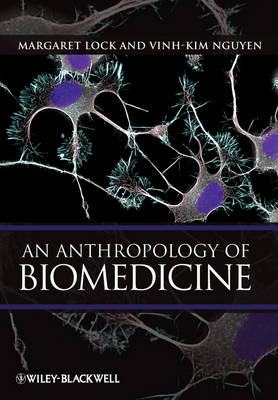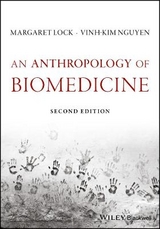
An Anthropology of Biomedicine
Wiley-Blackwell (an imprint of John Wiley & Sons Ltd) (Verlag)
978-1-4051-1071-6 (ISBN)
- Titel erscheint in neuer Auflage
- Artikel merken
Introduces biomedicine from an anthropological perspective, exploring the entanglement of material bodies with history, environment, culture, and politicsDevelops and integrates an original theory: that the human body in health and illness is not an ontological given but a moveable, malleable entityMakes extensive use of historical and contemporary ethnographic materials around the globe to illustrate the importance of this methodological approachIntegrates key new research data with more classical material, covering the management of epidemics, famines, fertility and birth, by military doctors from colonial times onUses numerous case studies to illustrate concepts such as the global commodification of human bodies and body parts, modern forms of population, and the extension of biomedical technologies into domestic and intimate domainsWinner of the 2010 Prose Award for Archaeology and Anthropology
Margaret Lock is the Marjorie Bronfman Professor Emerita in the Department of Social Studies of Medicine and the Department of Anthropology at McGill University. Among her numerous awards are the Gold Medal for Research by the Social Sciences and Humanities Research Council of Canada and the Wellcome Medal of Britain′s Royal Anthropological Society. In 2005 she was awarded both a Killam Prize and Trudeau Foundation Fellowship. She is the author and/or co–editor of 14 books and has published more than 190 articles. Vinh–Kim Nguyen is a physician and a medical anthropologist. He practices medicine in Montréal at the Clinique l′Actuel, which specializes in HIV and hepatitis, and the Emergency Department of the Jewish General Hospital, and teaches at the University of Montreal where he is an Associate Professor in Social Medicine. As a researcher, he is affiliated with both Global Health Unit of the Montreal University Hospitals′ Research Centre and the Max Planck Institute for Social Anthropology in Halle, Germany. He was recently awarded the Aurora prize for his research by the Social Sciences and Humanities Research Council of Canada.
Acknowledgments xii
Introduction 1
Improving Global Health: The Challenge 3
Biomedicine as Technology 4
Does Culture Exist? 6
A Word about Ethnography 9
Outline of Chapters 11
Part I: Technologies and Bodies in Context 15
1 Biomedical Technologies in Practice 17
Technological Mastery of the Natural World and Human Development 19
Technology and Boundary Crossings 20
Biomedicine as Technology: Some Implications 22
Technologies of Bodily Governance 24
Technologies of the Self 27
The Power of Biological Reductionism 29
Techno/Biologicals 30
2 The Normal Body 32
Cholera in the 19th Century 33
Representing the Natural Order 35
Truth to Nature 35
The Natural Body 37
A Numerical Approach 38
Other Natures 39
Interpreting the Body 42
How Normal Became Possible 43
When Normal Does Not Exist 46
Problems with Assessing Normal 47
Pathologizing the Normal 50
Limitations to Biomedical Objectivity 53
Better Than Well? 54
3 Anthropologies of Medicine 57
The Body Social 57
Contextualizing Medical Knowledge 60
Medical Pluralism 61
The Modernization of Traditional Medicine 63
Medical Hybridization 64
Biodiversity and Indigenous Medical Knowledge 65
Self–Medication 66
A Short History of Medicalization 67
Opposition to Medicalization 70
The Social Construction of Illness and Disease 71
The Politics of Medicalization 75
Beyond Medicalization? 78
In Pursuit of Health 79
In Summary 81
4 Local Biologies and Human Difference 83
The End of Menstruation 84
Local Biologies 90
Rethinking Biology in the Midst of Life s Complexity 92
Is Biology Real? 93
Kuru and Endocannibalism 95
Racism and Birth Weight 98
Of Microbes and Humans 99
Antibiotics and Resistant Microbes 102
Debates about the Origin of HIV 103
In Summary 108
Part II: The Biological Standard 111
5 The Right Population 113
The Origins of Population as a Problem 115
Addressing the Problem of Population 117
Improving the Stock of Nations 118
Alternative Modernity and Indian Family Planning 123
The One–Child Policy 127
Biomedical Technology and Sex Selection 132
Contextualizing Sex Selection: India and Family Balancing 133
Contextualizing Sex Selection: Disappeared Girls in China 136
Sex Selection in a Global Context 139
Reproducing Nationalism 142
In Summary 144
6 Colonial Disease and Biological Commensurability 146
An Anthropological Perspective on Global Biomedicine 147
Biomedicine as a Tool of Empire 148
Acclimatization and Racial Difference 149
Colonial Epidemics: Microbial Theories Prove Their Worth 151
Resistance to the Biomedicalization of Epidemics 153
Microbiology as a Global Standard 154
Infertility and Childbirth as Critical Events 157
Birthing in the Belgian Congo 158
A Global Practice of Fertility Control 160
Intimate Colonialism: The Biomedicalization of Domesticity 160
Biomedicine, Evangelism, and Consciousness 162
The Biological Standardization of Hunger 163
The Colonial Discovery of Malnutrition 164
Albumin as Surplus 166
The Biologization of Salvation 168
Madness 170
In Summary 174
7 Grounds for Comparison: Biology and Human Experiments 176
The Laboratory as the Site of Comparison 177
The Colonial Laboratory 178
Experimental Bodies 179
Rise of the Clinical Trial 180
Taming Difference by Chance 183
The Alchemy of the Randomized Controlled Trial 184
The Problem of Generalizability 184
Medical Standardization and Contested Evidence 187
Globalizing Clinical Research 188
Creating Markets for Biomedical Technologies in Developing Countries 190
Testing Biomedical Interventions for the World s Poor 192
Disputes over Perinatal HIV Transmission Trials 192
What Should Count as Signifi cant Evidence? 196
Living with Vampires: Perceptions of Research 197
Experimental Communities: Social Relations 200
In Summary 202
Part III: Moral Boundaries and Human Transformations 203
8 Who Owns the Body? 205
Commodification of Human Biologicals 206
Objects of Worth and Their Alienation 208
The Wealth of Inalienable Goods 209
A Bioeconomy of Human Biologicals 210
Who Owns the Body? 211
The Commodification of Eggs and Sperm 213
Immortalized Cell Lines 216
The Exotic Other 218
Biological Databases 220
Concluding Comments 226
9 The Social Life of Organs 229
Bioavailability Who Becomes a Donor? 230
A Shortage of Organs 234
Inventing a New Death 236
The Good–as–Dead 239
Struggling for National Consensus 241
The Social Life of Human Organs 244
When Resources Are Short 248
Altruism, Entitlement, and Commodifi cation 252
10 Kinship, Infertility, and Assisted Reproduction 254
Assisted Reproductive Technologies 255
Problematizing Infertility Figures 256
From Underfertility to Overfertility 257
Reproducing Culture 264
Assisted Reproduction in the United States 266
Assisted Reproduction in Egypt 269
Assisted Reproduction in Israel 273
ART in Global Perspective 277
Part IV: Elusive Agents and Moral Disruptions 281
11 The Matter of the Self 283
The Discovery of an Unconscious Self 284
Unlocking the Pathogenic Secret 285
The Pathogenic Secret as a Technology of the Self 286
The Making of Post–Traumatic Stress Disorder 287
The Practitioner–Self 289
The Sources of Therapeutic Effi cacy 290
The Self s Therapeutic Powers 292
Technologies of Health Promotion 295
Technologies of Empowerment 296
Technologies of Self–Help 297
Confessional Technologies 298
Conclusion 301
12 Genes as Embodied Risk 303
From Hazard to Embodied Risk 304
From Generation to Rewriting Life 306
Genomic Hype 308
Geneticization 310
Genetic Testing and Human Contingency 311
Genetic Citizenship and Future Promise in America 315
Biosociality and the Affi liation of Genes 316
Genetic Screening 319
Preimplantation Genetic Diagnosis 325
13 Genomics, Epigenomics, and Uncertain Futures 330
Dethroning the Gene? 332
Eclipse of the Genotype Phenotype Dogma 333
Epigenetics: Beyond Genetic Determinism 335
Epigenomics 337
The APOE Gene and Alzheimer s Disease 339
Genetic Testing for Late–Onset Alzheimer s Disease 343
Interpretations of Risk Estimates 345
Learning (Again) to Live with Uncertainty 347
14 Human Difference Revisited 348
Molecular Biology and Racial Politics 351
The Molecularization of Race 353
Commodifying Race and Ancestry 356
Looping Effects 357
Epilogue 359
Notes 365
Bibliography 430
Index 490
| Erscheint lt. Verlag | 9.4.2010 |
|---|---|
| Verlagsort | Chichester |
| Sprache | englisch |
| Maße | 168 x 245 mm |
| Gewicht | 890 g |
| Themenwelt | Sozialwissenschaften ► Soziologie |
| ISBN-10 | 1-4051-1071-6 / 1405110716 |
| ISBN-13 | 978-1-4051-1071-6 / 9781405110716 |
| Zustand | Neuware |
| Haben Sie eine Frage zum Produkt? |
aus dem Bereich



